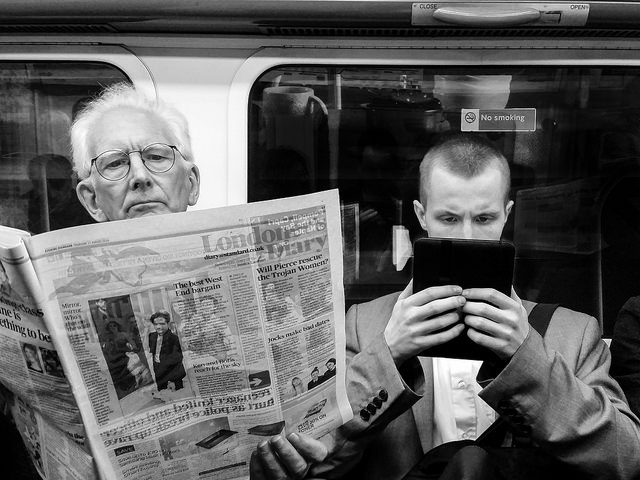rabble is expanding our Parliamentary Bureau and we need your help! Support us on Patreon today!
Please don’t think of this as shilling for the Star’s tablet version, Star Touch — now available in Android as well as iOS. If you don’t like the Star, you’ll probably dislike it in any version. But I’ve been intrigued by the concept of tablets since Steve Jobs introduced the iPad in 2010, calling it the most important thing he’d ever done. That claim rattled around in my head for years. It sounded like promotion, but also sounded like he meant it. Yet he’d already put out the iPhone. If he meant it, in what sense?
Here’s a guess. The tablet marks a definitive break with the world of work. In their primeval origins, the devices Jobs and others created were tethered to work and its products, above all: to the typewriter. They had keyboards you tapped, and out came a thing, on paper, even if it emerged via a printer. There was no connectivity, how could there be? There was no Internet! Yet it’s as if Jobs intuited some other purpose for these devices, and always hated those infernal keys. He longed to cut the cord with work, without knowing why.
Laptops changed nothing basic, even as connectivity exploded. Those keys persisted. What was needed was something on which it was relatively difficult to work, et voilà, the tablet. Yet most reviews still focus on which device best suits your work needs. I avoided a tablet because I was waiting for one I could write on. I succumbed when I realized it isn’t for writing at all. It’s for the world of non-work: friendship, playing, expanding your mind, or just being. Stuff most of us, raised as we were, feel slightly guilty about, and don’t associate with technology. The tablet implies that the world of work won’t always be with us.
For the young, who sense the future, it’s different. Work for them is often daunting and worrisome, less of a noble goal or duty. They assume their reality involves seamless connectivity. They get it, but are often so economically stressed that they don’t have much time for it. Their elders may have time but lack the mentality. And yet the young make do mostly with their phones. Why did Jobs expend his brightest hopes not on the smartphone but on the tablet?
Phones (which, in their talky origins were also blind to their destiny) are a half-measure. They don’t have keys, except the poor doomed BlackBerry, but they’re still keyed largely to work purposes. People check job postings on them, and routes for getting to that interview. Of course phones do much else, so their screens keep expanding — as if they yearn to be sheer connectivity, versus workaday utility, but won’t admit it. Tablets know better who they are, but may have arrived before their time.
I showed the tabletized Star to a tech-savvy 17-year-old (tautological or what?). He said: You may tell them at the Star that I was impressed. He liked the swiping between items and tapping on features like Easter eggs. But I think he also liked the self-contained quality, versus the pastiche of meandering among sites and apps. In ways a tablet paper is the return of the morning paper you took in off the porch. It’s self-sufficient and you spend time with it, one-on-one.
It also has a tactile element that older people pine for: turning pages of the paper over breakfast or fingering through a book. Tablet versions have tactility in another form, which appeals to young users. It’s the directness of the tactility that matters, not the material. Cursors don’t do it for anyone.
Tablet papers also provide what’s now called a curated experience. That used to go under the head of gatekeepers and I’ve hated it all my life: editors and pundits who tell you what you need to know and how to think. But now, in retrospect, I sort of miss it. It gave you something to butt heads with and develop your own thoughts and values against — the way growing up with parents should. It implied there are better and worse ways to see reality. Versus what? Donald Trumpism, where you just jut out your jaw and declare how you want things to be, disdaining all analysis. Mindlessness is far too at home on the Internet, with its random flows and absence of order or judgment.
This column was first published in the Toronto Star.
Photo: Matthew G/flickr
rabble is expanding our Parliamentary Bureau and we need your help! Support us on Patreon today!




